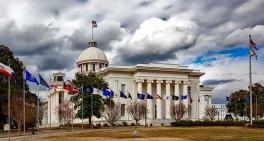Supreme Court won’t revive school’s transgender bathroom ban
U.S. Court News
The Supreme Court on Monday rejected a Virginia school board’s appeal to reinstate its transgender bathroom ban.
Over two dissenting votes, the justices left in place lower court rulings that found the policy unconstitutional. The case involved former high school student Gavin Grimm, who filed a federal lawsuit after he was told he could not use the boys bathroom at his public high school. Justices Samuel Alito and Clarence Thomas voted to hear the board’s appeal.
The Gloucester County, Virginia, school board’s policy required Grimm to use restrooms that corresponded with his biological sex — female — or private bathrooms.
Seven years ago, Grimm was barred from using the boys restroom when he was a 15-year-old student at Gloucester High School. He sued a year later, and his case has worked its way through the courts ever since.
After learning that the Supreme Court refused to hear the case, Grimm, now 22, said that his long court battle is over. “We won,” he tweeted. “Honored to have been part of this victory,” he added.
David Corrigan, an attorney for the school board, did not immediately respond to email and voice mail messages seeking comment.
In its petition asking the Supreme Court to hear the case, the school board argued that its bathroom policy poses a “pressing federal question of national importance.”
The board argued previously that federal laws protect against discrimination based on sex, not gender identity. Because Grimm had not undergone sex-reassignment surgery and still had female genitalia, the board’s position has been that he remained anatomically a female.
The American Civil Liberties Union, which represented Grimm in his years long lawsuit against Gloucester, argued that federal law makes it clear transgender students are protected from discrimination.
Related listings
-
Bankruptcy is Just Filling Out Some Forms, Right?
U.S. Court News 06/22/2021Nothing could be further from the truth! My job as a Bankruptcy Attorney is to help clients understand the process, and how to navigate all of the complexities of Bankruptcy Law. My job is also to educate the public about common misconceptions of the...
-
High court sides with ex-athletes in NCAA compensation case
U.S. Court News 06/21/2021The Supreme Court decided unanimously Monday that the NCAA can’t enforce rules limiting education-related benefits — like computers and paid internships — that colleges offer to student athletes. The case doesn’t decide whethe...
-
Iowa’s high court stops lawsuit over farm runoff pollution
U.S. Court News 06/18/2021A sharply divided Iowa Supreme Court on Friday stopped a lawsuit aimed at reducing the flow of fertilizer and hog farm waste into the state’s river and streams, finding that limiting pollution from farms was a political matter and not one for t...

USCIS Adjusting Premium Processing Fee
U.S. Citizenship and Immigration Services (USCIS) announced today it is adjusting the premium processing fee for Form I-129, Petition for a Nonimmigrant Worker and Form I-140, Immigrant Petition for Alien Workers beginning on Oct. 1, 2018 to more effectively adjudicate petitions and maintain effective service to petitioners.
The premium processing fee will increase to $1,410, a 14.92 percent increase (after rounding) from the current fee of $1,225. This increase, which is done in accordance with the Immigration and Nationality Act, represents the percentage change in inflation since the fee was last increased in 2010 based on the Consumer Price Index for all Urban Consumers.
“Because premium processing fees have not been adjusted since 2010, our ability to improve the adjudications and service processes for all petitioners has been hindered as we’ve experienced significantly higher demand for immigration benefits. Ultimately, adjusting the premium processing fee will allow us to continue making necessary investments in staff and technology to administer various immigration benefit requests more effectively and efficiently,” said Chief Financial Officer Joseph Moore. “USCIS will continue adjudicating all petitions on a case-by-case basis to determine if they meet all standards required under applicable law, policies, and regulations.”
Premium processing is an optional service that is currently authorized for certain petitioners filing Forms I-129 or I-140. The system allows petitioners to request 15-day processing of certain employment-based immigration benefit requests if they pay an extra fee. The premium processing fee is paid in addition to the base filing fee and any other applicable fees, which cannot be waived.




